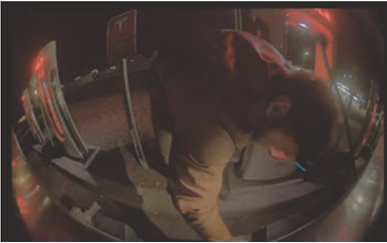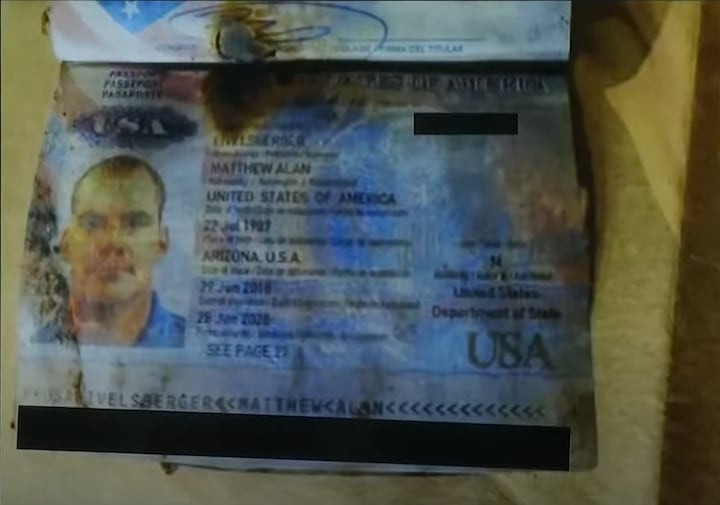The bizarre New Year's Day Tesla Cybertruck explosion near the Trump International Hotel in Las Vegas has Arizona connections.
The deceased suspect, 37-year-old Matthew Alan Livelsberger, was born in Arizona according to a passport discovered in a severely burned wallet found in the back seat of the vehicle. Also, the Grand Canyon was reportedly considered as an alternate potential detonation site, according to the alleged email "manifesto". And the vehicle stopped at three Arizona Tesla charging stations, after being initially rented in Colorado.
 A video shown
during a January 3rd law enforcement news briefing depicted a man wearing a
Black Cat Fireworks T shirt and subsequently a jacket, identified by Las Vegas
Metropolitan Police Department as Livelsberger, charging the Cybertruck at
a
Tesla charging station in the Kingman
Carl's Jr. parking lot on West Beale Street around 5:33 am.
A video shown
during a January 3rd law enforcement news briefing depicted a man wearing a
Black Cat Fireworks T shirt and subsequently a jacket, identified by Las Vegas
Metropolitan Police Department as Livelsberger, charging the Cybertruck at
a
Tesla charging station in the Kingman
Carl's Jr. parking lot on West Beale Street around 5:33 am.
The short video can be viewed online, uploaded by X user Mrgunsngear on January 4th, at:
x.com/Mrgunsngear/status/1875593808697872428/mediaviewer
Prior to stopping in Kingman,the Cybertruck had also charged up at locations in Flagstaff and Holbrook.
X user, Cecil Jolley, posted on January 5th that "My dad owns the Burger King which hosts the Supercharger in Holbrook, AZ. He says they have videos and cc receipts and have spoken to FBI."
Livelsberger was a career active duty Army Green Beret from Colorado Springs, who had served 19 years with multiple deployments including Afghanistan, and had been awarded the Bronze Star. According to FBI Special Agent in charge for Las Vegas, Livelsberger suffered from post traumatic stress disorder and harbored no animosity towards President Trump or Elon Musk, despite the choice of car bomb vehicle and detonation location.
The tracking of Livelsberger's precise movements sheds light on digital age technology tracking people's movements, habits and where they are going. Modern cars are built with sophisticated onboard computers, with features such as navigation, app-based unlocking, camera-recording and self-autonomous driving capabilities. Drivers face the growing reality of their actions on the road being constantly logged and analyzed, This raises concerns among technology experts about ethics and privacy.
"We're forgetting it’s not the car from decades ago, it’s totally different, it’s all based on computers and what computers do is function on data has to be collected and stored somewhere," said Jodi Daniels, CEO of privacy consultancy firm Red Clover Advisors,
Many drivers opt into data-collecting unaware that they can choose not to, or the privacy policy their manufacturer has is often too vague to understand, Daniels told USA Today. Even if someone does allow their data to be gathered, policies can change, and what they originally consented to may no longer align with how their information is used, Daniels said.
Tesla states in its Customer Privacy Notice that a Tesla car "generates vehicle, diagnostic, infotainment system, and Autopilot data" but "does not associate that data with your identity or account by default," including camera recordings. Also that Tesla may share information with third parties.
"There is a history of abuse of the kind of data that Tesla collects about its drivers," said Eva Galperin, Cybersecurity Director at the Electronic Frontier Foundation. Between 2019 and 2022, Tesla employees were internally sharing videos and recordings from customer cars, both when on and off, including when someone was naked and road rage incidents, according to Reuters interviews with nine former employees.
Galperin said it's important to note that the Cybertruck used in the blast was rented, so "you can expect every form of tracking to be turned on," compared to driving your personal vehicle.
According to Galperin, there are no current federal regulations when it comes to the privacy of vehicle-collected data, although states such as California have some protections. "I don't think there will be something on the federal level in say, the next four years,"
Concerns about privacy are likely to grow as car technology advances and self-driving vehicles, such as the Cybertruck, become more prevalent.

